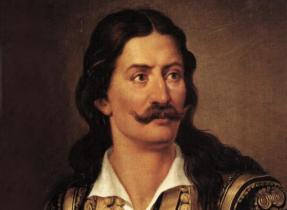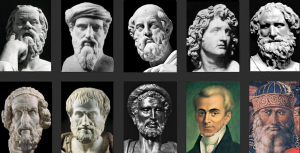
Commander, Hero of the Greek War of Independence (1788 – 1821)
Athanasios Diakos was one of the major heroes of the Greek War of Independence and today a national hero of Greece. Born in 1788 into a family of klephts as Athanasios Grammatikos, Diakos became a monk and then a deacon at the monastery of Saint John the Baptist. Following a feud with a Turk and his rising revolutionary spirit, Diakos left the monastery and became a harmatolos in the mountains, hunting and taking down the Turkish army, mainly in Central Greece.
In 1818, Diakos joined the army of Odysseus Androutsos, another prominent hero of the War of Independence, in Ioannina, formed his own army of klephts and harmatoles and joined the secret society for the liberation of Greece, the Philiki Hetairia. For the next two years, Diakos organized armies of klephts and harmatoles to reclaim cities in Central Greece; most notably, on April 4th 1821, he besieged Levadeia and the city of Thebes, forcing the entire Turkish population to flee.
Following the liberation of Leviadeia, Diakos joined fellow fighters Panourgias and Dyovouniotes to stop Omer Vrioni and his 8.900-10.000 men from reaching the city of Roumeli in Peloponnese, where the Turks planned to suppress another major revolt. Repeating Leonidas‘ plan against the Persians almost 2.000 years ago, Diakos decided to block Omer Vrioni’s army at Thermopyale. An army of 1500 Greeks was divided into 3 parts: Panourgias in Chalcomata, Dyovouniotes in Gorgopotamos and Diakos in Alamana, a significant battle which would become known as the Battle of Alamana. The Greek army suffered heavy losses and was forces to retreat. Diakos and his remaining 48 warriors chose to fight to the last stand.
Diakos was caught and tortured by Omer Vrioni and his men. Admiring Diakos’s commanding and fighting abilities, he offered him the rank of officer in his army, to which he replied:
I was born a Greek, and I will die a Greek!
Diakos was then impaled and left under the burning sun to die. A fellow Greek who tried to save him from the martyrdom shot him but missed and wounded Diakos’s arm. Diakos was then burned, still alive.
Although the battle at Alamana was lost, Diakos’ brave stand against the enemy strengthened the Greek’s belief in the War more than anything at the time. Like Leonidas, Diakos instantly became a symbol of patriotism and a national hero. Today, a monument stands at the site of his final stand and the Greek Army posthumously honored him with the rank of general, while numerous folk songs have been written to his memory.
Bibliography
- “Diakos, Athanasios”. Helios New Encyclopaedic Dictionary. Passas, I. Athens, 1946. Print.
- GPITRAL5 Education Culture e-learning. Athanasios Diakos. Youtube. November 16, 2012. Web. September 15, 2016.

[…] fought alongside Athanasios Diakos and Panourgias, whom he considered Isaiah as his right-hand man. He had joined as a mere soldier in […]
LikeLike
[…] is often compared to fellow Freedom Fighter Athanasios Diakos, both of whom share the same name. Like him, Karpenisiotis died by fighting an unequal battle, […]
LikeLike